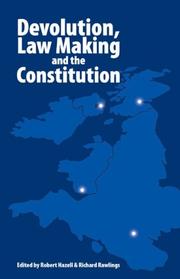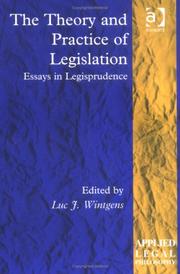| Listing 1 - 10 of 206 | << page >> |
Sort by
|
Book
ISBN: 1536170992 Year: 2020 Publisher: New York : Snova,
Abstract | Keywords | Export | Availability | Bookmark
 Loading...
Loading...Choose an application
- Reference Manager
- EndNote
- RefWorks (Direct export to RefWorks)

ISBN: 1845408152 9781845408152 9781845400996 1845400992 Year: 2005 Publisher: Exeter, United Kingdom ; Charlottesville, Virginia : Imprint Academic,
Abstract | Keywords | Export | Availability | Bookmark
 Loading...
Loading...Choose an application
- Reference Manager
- EndNote
- RefWorks (Direct export to RefWorks)
Law making is a primary function of government, and how well the three devolved UK legislatures exercise this function will be a crucial test of the whole devolution project. This book provides the first systematic study and authoritative data to start that assessment. It represents the fruits of a four-year collaboration between top constitutional lawyers from Scotland, Wales and Northern Ireland and leading researchers in UCL's Constitution Unit. The book opens with detailed studies of law making in the period 1999-2004 in the Scottish Parliament and the Assemblies in Wales and Northern Irel
Book
ISBN: 1593327293 9781593327293 9781593326289 1593326289 Year: 2013 Publisher: El Paso, Tex. : LFB Scholarly Pub. LLC,
Abstract | Keywords | Export | Availability | Bookmark
 Loading...
Loading...Choose an application
- Reference Manager
- EndNote
- RefWorks (Direct export to RefWorks)
Congressional constitutional deliberation is circumscribed by the political regime and time within which it takes place. By understanding the three cases studied here to have taken place within affiliated time, by which they inhabit and exhibit specific regime constructs, the political regime and political time paradigms are affirmed. Each case demonstrates the importance of regime contestation: the normative debate between competing national governing coalitions. Congress acts as a partisan institution functioning within a political environment encompassing both fundamental "settled" values and secondary "unsettled" values. Its deliberation is symbolic and derivative in nature, acting under an umbrella of judicial supremacy and attempting to influence unsettled values, by which regime shifts are desired. These cases belie the notion of "settled" law and a "settled" regime, yet Congress plays a representational role by acting, and, further still, continues and perpetuates an ongoing dialogue with the other branches and national polity which would not take place otherwise.
Legislative power --- Separation of powers --- Constitutional law
Book
ISBN: 1536116165 Year: 2011 Publisher: New York : Nova Science Publishers, Inc.,
Abstract | Keywords | Export | Availability | Bookmark
 Loading...
Loading...Choose an application
- Reference Manager
- EndNote
- RefWorks (Direct export to RefWorks)
Legislative power --- Interstate commerce --- Law and legislation

ISBN: 9781351881272 1351881272 9780754624615 1351881264 9781351881265 1138264083 9781138264083 1315236842 9781315236841 Year: 2016 Publisher: London ; New York : Routledge,
Abstract | Keywords | Export | Availability | Bookmark
 Loading...
Loading...Choose an application
- Reference Manager
- EndNote
- RefWorks (Direct export to RefWorks)
Legislation. --- Legislative power. --- Law --- Constitutional law --- Political aspects. --- Philosophy.
Book
ISBN: 1351881264 1138264083 1315236842 Year: 2016 Publisher: London ; New York : Routledge,
Abstract | Keywords | Export | Availability | Bookmark
 Loading...
Loading...Choose an application
- Reference Manager
- EndNote
- RefWorks (Direct export to RefWorks)
Legislation. --- Legislative power. --- Law --- Constitutional law --- Political aspects. --- Philosophy.
Book
ISBN: 1509908749 1509908730 9781509908738 9781509908745 9781509908721 1509908722 9781509908714 1509908714 Year: 2018 Publisher: Oxford ; Portland, Oregon : Hart Publishing,
Abstract | Keywords | Export | Availability | Bookmark
 Loading...
Loading...Choose an application
- Reference Manager
- EndNote
- RefWorks (Direct export to RefWorks)
Parliament and the Law (Second Edition) is an edited collection of essays, supported by the UK's Study of Parliament Group, including contributions by leading constitutional lawyers, political scientists and parliamentary officials. It provides a wide-ranging overview of the ways in which the law applies to, and impacts upon, the UK Parliament, and it considers how recent changes to the UK's constitutional arrangements have affected Parliament as an institution. It includes authoritative discussion of a number of issues of topical concern, such as: the operation of parliamentary privilege, the powers of Parliament's select committees, parliamentary scrutiny, devolution, English Votes for English Laws, Members' conduct and the governance of both Houses. It also contains chapters on financial scrutiny, parliamentary sovereignty, Parliament and human rights, and the administration of justice. Aimed mainly at legal academics, practitioners, and political scientists, it will also be of interest to anyone who is curious about the many fascinating ways in which the law interacts with and influences the work, the constitutional status and the procedural arrangements of the Westminster Parliament
Legislative power --- Great Britain. --- Powers and duties. --- Privileges and immunities.
Book
ISBN: 9789282354940 9282354946 Year: 2014 Publisher: Luxembourg Publications Office of the European Union
Abstract | Keywords | Export | Availability | Bookmark
 Loading...
Loading...Choose an application
- Reference Manager
- EndNote
- RefWorks (Direct export to RefWorks)
Legislative power --- European Parliament. --- European Union countries --- Politics and government
Book
ISBN: 042997499X 0429495366 0813347580 9780813347585 9780813347561 0813347564 Year: 2018 Publisher: New York ; London : Routledge, Taylor & Francis Group,
Abstract | Keywords | Export | Availability | Bookmark
 Loading...
Loading...Choose an application
- Reference Manager
- EndNote
- RefWorks (Direct export to RefWorks)
A clear and student-friendly introduction to Congress that uses ?Congress as board of directors" as an overarching theme to explain Congress's roles and functions within the interdependent system of the US government.
Legislative power --- Representative government and representation --- United States.
Book
ISBN: 0300206569 9780300206562 9780300179910 030017991X 9780300179910 Year: 2014 Publisher: New Haven, CT : Yale University Press,
Abstract | Keywords | Export | Availability | Bookmark
 Loading...
Loading...Choose an application
- Reference Manager
- EndNote
- RefWorks (Direct export to RefWorks)
In this timely and important work, eminent political theorist John Dunn argues that democracy is not synonymous with good government. The author explores the labyrinthine reality behind the basic concept of democracy, demonstrating how the political system that people in the West generally view as straightforward and obvious is, in fact, deeply unclear and, in many cases, dysfunctional. Consisting of four thought-provoking lectures, Dunn's book sketches the path by which democracy became the only form of government with moral legitimacy, analyzes the contradictions and pitfalls of modern American democracy, and challenges the academic world to take responsibility for giving the world a more coherent understanding of this widely misrepresented political institution. Suggesting that the supposedly ideal marriage of liberal economics with liberal democracy can neither ensure its continuance nor even address the problems of contemporary life, this courageous analysis attempts to show how we came to be so gripped by democracy's spell and why we must now learn to break it.
Democracy --- Legislative power. --- Power, Legislative --- Constitutional law --- Implied powers (Constitutional law) --- Judicial review --- Separation of powers --- Philosophy. --- Legislative power --- Philosophy
| Listing 1 - 10 of 206 | << page >> |
Sort by
|

 Search
Search Feedback
Feedback About UniCat
About UniCat  Help
Help News
News